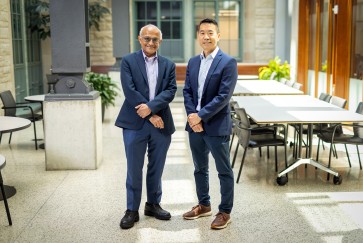The Northwestern Buffett Institute for Global Affairs will host an “Idea Incubation Workshop” next week to select research projects aimed at finding interdisciplinary and global solutions to some of the world’s most vexing problems.
The Northwestern Buffett Idea Incubation Workshops are one of the institute’s new initiatives to be held annually, bringing faculty from across the University together with diverse participants from the arts, industry, civil society and government.
The first workshop will be held Nov. 15-17. The opening and closing sessions are open to faculty, students and the public. The opening plenary, “Collaboration outside the safety zone,” will be Friday, Nov. 15, from 9 a.m. to 11 a.m. (RSVP here), and a pitch competition will be Sunday, Nov. 17, from 11 a.m. to 2:30 p.m. (RSVP here) at 1800 Sherman Av., Evanston.
“In a global environment, excellence in research, innovation and the arts can only be achieved through collaboration with those beyond our field and beyond our country’s institutions and concepts,” said Annelise Riles, executive director of the Buffett Institute and associate provost for global affairs.
This year’s workshop will feature three parallel thematic groups chosen for their deep interdisciplinary and global nature — and for their potential to make a substantial social impact in line with the United Nations’ Sustainable Development Goals.
Starting with “idea incubation lunches” held throughout the last academic year, the three projects have been honed to be presented at the workshop this fall on Northwestern University’s campus. The three proposals under consideration are focused on:
- Censorship, propaganda and persecution of journalists
- Disproportionate impacts of environmental challenges
- Palliative care and humanitarian crises
The workshop will provide each group a unique opportunity to take risks and engage in imaginative exploration over the course of the weekend with scholars and thought leaders beyond their usual community of scholars — in order to develop impactful questions for research and concrete plans for action.
Northwestern faculty leaders and invited guests will form thematic groups, or “Idea Streams,” for the purpose of collectively identifying emerging challenges that can be addressed through research, dialogue, strategic output and action.
On Sunday, Nov. 17, the final day of the workshop, the Buffett Institute will hold a plenary session during which each group will pitch a refined proposal for collaborative research and action. Participants have been enthusiastic about the process.
“With the deterioration of media independence and the increased persecution and harassment of journalists around the world, Buffett's idea workshop presents unique opportunities for bringing different voices together to address the alarming trends,” said Doreen Weisenhaus, director of the Media Law and Policy Initiative, and a senior lecturer at the Medill School of Journalism, Media, Integrated Marketing Communications and Northwestern Pritzker School of Law, who is co-leading the journalism project.
“There is an urgent need to think outside the box and find new solutions and strategies, while enhancing efforts already underway,” Weisenhaus said.
“The idea workshop is intended to move us beyond the what questions and instead ask how we can generate research that is meaningful, relevant, actionable and rigorous,” said Kimberly Marion Suiseeya, assistant professor in the Department of Political Science’s Environmental Policy and Culture Program and leader on the environmental idea project. “For me this means prioritizing voices that are often overlooked in global environmental change research, such as Indigenous Peoples, traditional peoples and other so-called marginalized groups. Research often has or advances hidden truths that may be harmful to communities: It is an inherently political endeavor.”
A selection panel of five judges selected by the Buffett Institute will include:
- Bonnie Daniels, chair of the Weinberg College Board of Visitors and Northwestern trustee
- Sarah Fodor, executive director, Northwestern’s Office of Foundation Relations and Corporate Engagement
- Henry Godinez, professor, Northwestern Department of Theatre, and resident artistic associate, Goodman Theatre
- Larry Irving, founder and president, The Irving Information Group, and Northwestern trustee
- Ravina Shamdasani, deputy spokesperson, United Nations Human Rights Office
Panelists will consider the intellectual merit and potential for societal impact of each group’s proposal. In addition to providing constructive feedback to each group, the panel will select one or more projects for ongoing support and funding from the Northwestern Buffett Institute.
After the workshop, groups with the strongest ideas and associated research and action plans will be invited to continue their collaborative work for two years, forming working groups. Each of these groups will be backed by a package of Buffett support, including funding, fundraising help, graduate assistantships and a staffing team to assist with operations.
The goal is to find research solutions for global challenges and then work to implement those solutions with global stakeholders who can generate the greatest social impact, including through work with policymakers, lawmakers or civil society groups.

